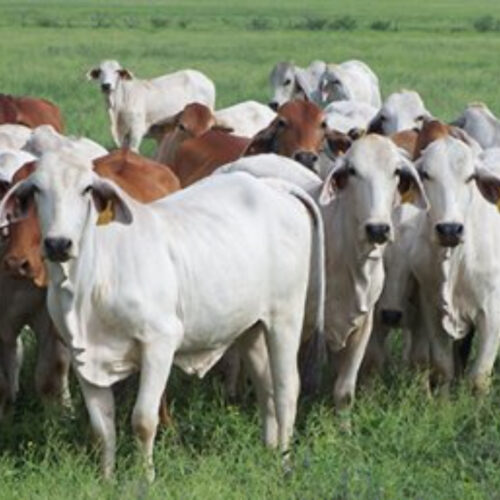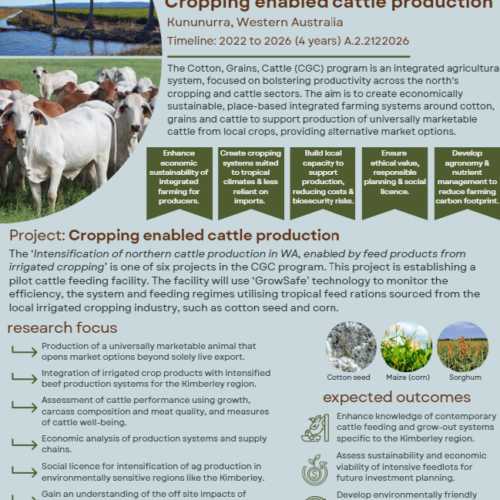
- Reference # A.2.2122029
- Project Status Current
- Timeframe 3.5 years (2022 to Aug 2026)
- Project manager Ian Biggs
- CRCNA Funding $1,450,000
- Total project value $6,175,350
- Project research participant WA Govt, Dept. Primary Industries and Regional Development ; University of Western Australia ; Murdoch University ; CSIRO
- Project research co-funder Cotton Research and Development Corporation (CRDC) ; WA Govt, Dept. of Primary Industries and Regional Development
- Research Programs 3. Production and supply chain innovation in Northern Australia
- Location Kununurra
- Cotton Grains Cattle program
- Agriculture
- Beef
Summary
The project will address research questions underpinning the intensification of irrigated crop and beef production systems in northern Western Australia (WA), particularly centred around the Ord River Irrigation Area (ORIA). A key focus is to what extent feed products from irrigated cropping can contribute to local cattle finishing systems, ultimately to produce a universally marketable animal and reduce the reliance on live export markets. Specifically, the project will establish a pilot cattle feeding facility using a ‘GrowSafe’ feed efficiency system and utilise a range of tropical feed rations sourced from the irrigated cropping industry (including cotton by-products and corn).
Cattle performance will be assessed using growth, carcass composition and meat quality, along with measures of cattle well-being. Economic analysis of these systems and supply chains will also be undertaken. The social licence for intensification of agricultural production is increasingly being scrutinised and is particularly visible in environmentally sensitive regions such as northern WA. The environmental risks of irrigated cropping and intensive feeding systems, with a focus on water quality through efficient irrigation and use of pesticides and herbicides will be reviewed. Concurrent research to measure livestock methane emissions using a ‘GreenFeed’ system will assist with developing an economically viable supply chain with a small environmental footprint.
Expected outcomes
The intermediate outcome of this work, will be new knowledge of feeding systems which will enable optimal backgrounding and grow-out systems to be developed for cattle in the Kimberley region of northern WA.
The project will assess whether intensive feedlots are appropriate, economic and sustainable for northern WA and support future investment planning.
The long-term outcome will be an environmentally friendly intensification of northern beef production systems based on an affordable source of protein enabling local processing.
updates
CRCNA Cotton, Grains and Cattle program
Get the latest updates on the Cotton, Grains and Cattle program.
Publications
18 July 2024
Cotton, Grains Cattle program: Intensification of northern cattle production in WA, enabled by feed products from irrigated cropping
Type: Fact sheet
Industry: Cotton Grains Cattle program, Agriculture, Beef, Broadacre cropping


